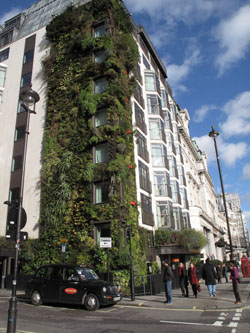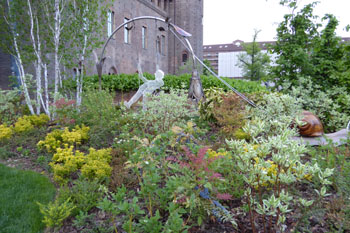Summary
Summary
 ‘GreenInUrbs’ is a European-funded network that brings together researchers, practitioners and policymakers to explore the environmental, social and economic benefits that green infrastructure can provide. Green infrastructure is a term used to describe all the green and blue spaces in and around towns and cities. It can include parks, woodlands, nature reserves, green corridors, roofs, walls, streams, rivers, lakes and much more. Our network is particularly interested in the urban tree and forest component of green infrastructure. This resource can provide a wide range of benefits including playing a role in combating flooding, reducing pollution, increasing residential value, contributing to local economies and providing space for recreation, relaxation and enjoyment. Watch Liz O’brien talk about the green infrastructure project in this video interview.
‘GreenInUrbs’ is a European-funded network that brings together researchers, practitioners and policymakers to explore the environmental, social and economic benefits that green infrastructure can provide. Green infrastructure is a term used to describe all the green and blue spaces in and around towns and cities. It can include parks, woodlands, nature reserves, green corridors, roofs, walls, streams, rivers, lakes and much more. Our network is particularly interested in the urban tree and forest component of green infrastructure. This resource can provide a wide range of benefits including playing a role in combating flooding, reducing pollution, increasing residential value, contributing to local economies and providing space for recreation, relaxation and enjoyment. Watch Liz O’brien talk about the green infrastructure project in this video interview.
Research objectives
- To increase understanding of the role of urban forestry in the context of green infrastructure
- To identify priorities and challenges for future research in the field
- To provide indicators to be included by policymakers in local, national or international strategies about green infrastructure and urban forestry
- To develop guidelines for green infrastructure planners and managers on how to implement green infrastructure approaches
Results so far
Working Group 1 – Environmental services of green infrastructure and implications of climate change
Working Group 2 – Social and cultural services and values of green infrastructure (led by Liz O’Brien) see the paper.
Working Group 3 – Governance of urban forestry within a green infrastructure approach
Working Group 4 – Integration and dissemination of research to stakeholders
Activities include the following:
- An interactive website
- Development of guidelines for managers and private citizens which will advise on the best tree species and the best practices for the maximization of benefits from green infrastructure
- Creation of a scientific position paper to highlight research priorities and challenges regarding green infrastructure
- Implementation and diffusion of models for estimation of the benefits derived from urban forests
- Development of a roadmap for policymakers in order to provide indicators and tools to be included in legislation at local, national or European level regarding the governance of green infrastructure
- Publication of a book including all the main achievements by the different working groups.

Status
The network started in 2013 and ended in 2017. The final conference of the network took place in Italy on 4-7th April 2017, downloads and interviews are available.(External site). Further work is being developed.
Contact
Funders and partners
This network is COST Action FP1204 funded by the European Union. Thirty five countries are involved and over 300 participants.
